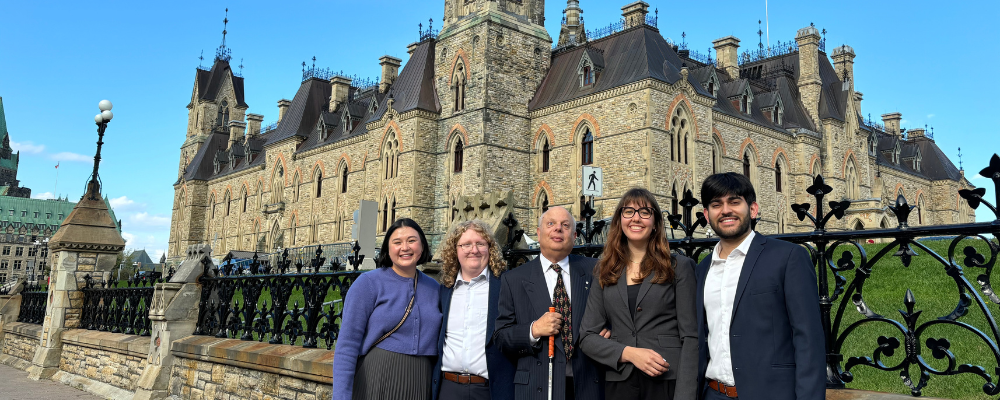1L students visit House of Commons to experience ‘disability activism unfolding in real time’
December 03, 2024

Photo: LTR students Elyse Kim, Ryah Peters, Professor David Lepofsky, Kate Groenewegen and Shivohum Nar stand in front of the Canadian parliament buildings (Submitted)
When the Accessible Canada Act was passed in 2019, the legislation promised to remove barriers for Canadians living with disabilities by 2040. According to visiting research professor of disability rights, David Lepofsky, progress towards these goals has been severely lacking.
In October, he was invited to appear before the House of Commons Standing Committee on Human Resources, Skills and Social Development and the Status of Persons with Disabilities to discuss the Accessible Canada Act. For the second time this year, a group of Western Law students accompanied Lepofsky to the House of Commons to observe the public advocacy process.
In his capacity as the chair of the Accessibility for Ontarians with Disabilities Act Alliance, Lepofsky is often called upon by public officials to share his lived experiences and represent the interests of Canadians with disabilities. At the hearing, he critiqued the “extremely weak implementation and enforcement” of the act.
“The act does not, at present, require any disability barrier to ever be removed or prevented in any organization that the federal government can regulate,” said Lepofsky in his remarks to the committee. “Not one single accessibility standard that is enforceable in law has been enacted in the five years since this law was passed.”
Lepofsky also presented a summary of his written brief to the committee, which offers 10 practical solutions for the effective implementation of the national disability strategy. These suggestions include implementing a deadline for the government to pass an accessible standard enforceable by law, establishing a centralized agency to oversee the implementation of the act, and halting spending on new government projects that don’t meet accessibility standards.
Western Law supported this experiential learning opportunity to advance efforts to embed equity, diversity, inclusion, decolonization and accessibility education into the JD program. Prior to the hearing, Lepofsky met with students to provide background on the act and discuss advocacy tactics. The students also had the opportunity to meet MPs and gather afterwards to reflect on lessons learned.
“As students prepare to enter the legal profession, it’s critical that they gain an understanding of the issues facing equity-deserving Canadians including those living with disabilities,” said assistant dean, EDID, Sunil Gurmukh.
“As future lawyers, judges, and policy makers of all kinds, we hope that having awareness of the lived experiences of those they will represent will equip them to be more effective advocates who are motivated to drive change.”
Kate Groenewegen was among the four 1L students who accompanied Lepofsky to Ottawa. Having completed a minor in Disability Studies at Kings University College during her undergraduate studies, she welcomed the opportunity to learn about advocacy strategies for Canadians with disabilities.
“I've always been interested in policy and how it impacts people with disabilities in Canada, so I jumped at the opportunity to get to hear from Professor Lepofsky and watch disability activism unfolding in real time. The experience showed me how valuable the work that Professor Lepofsky is doing is and how that activism happens,” said Groenewegen.
“He has spent so much of his life working to get into those rooms and advocate for people with disabilities. It's very tireless he just keeps going and working to make sure legislation is being made that benefits Canadians with disabilities, and that it's being enforced.”
Lepofsky’s mentorship has helped Groenewegen understand the diverse skills and the fortitude required to achieve progress through advocacy. She appreciated witnessing his strategic approach to advocacy including being physically present for the hearing, networking across party lines and capitalizing on communications and media relations opportunities. She’s grateful to have gained a deeper understanding of the intersection of legislation and disability justice and is now reflecting on how she can carry those lessons forward.
“It really reinforced for me the impact that law and policy can have on the lives of people with disabilities,” said Groenewegen. “It made me reflect on how various legal issues could be relevant to people with disabilities and how I can apply that lens to my legal education and career.”






